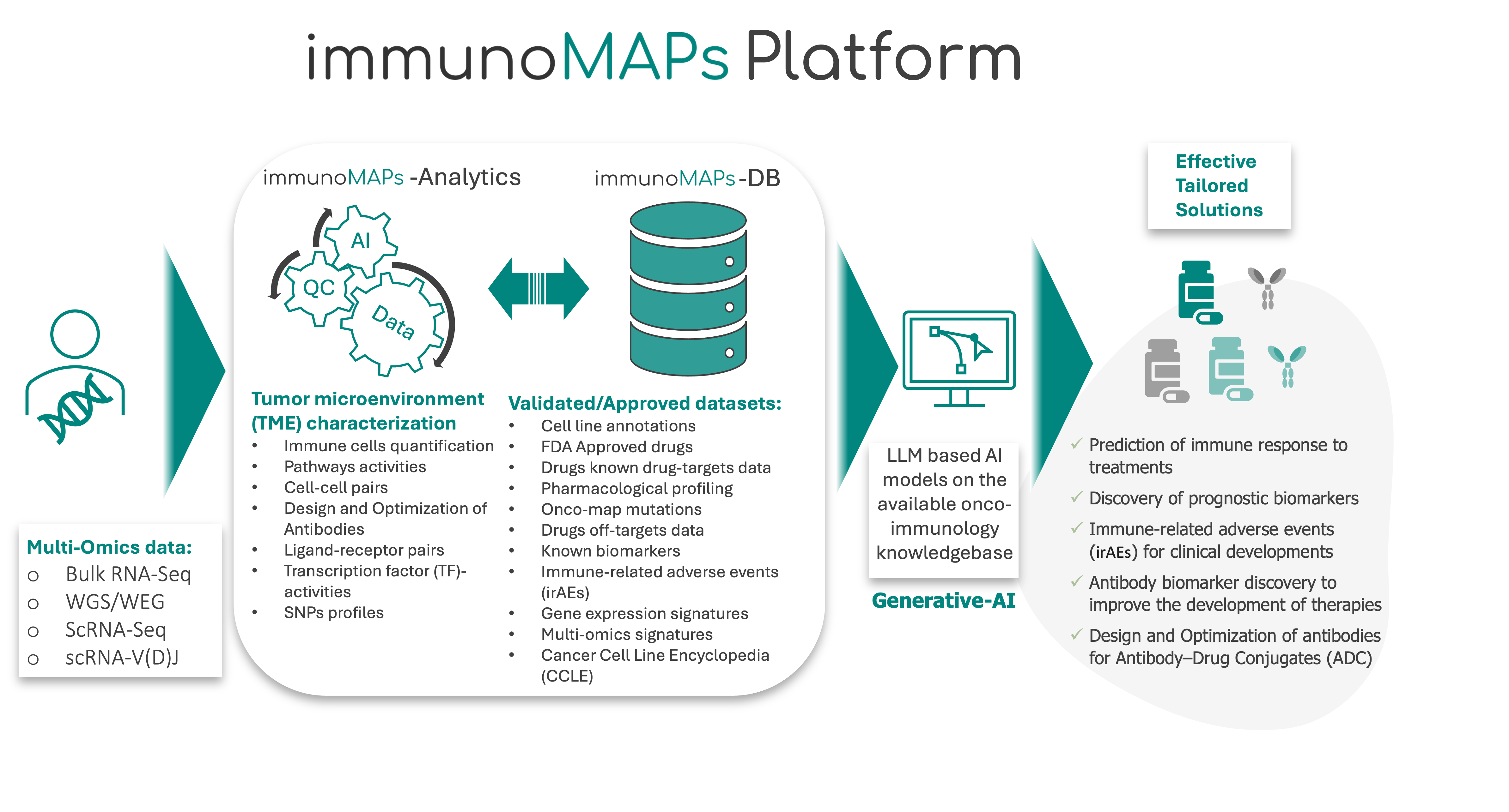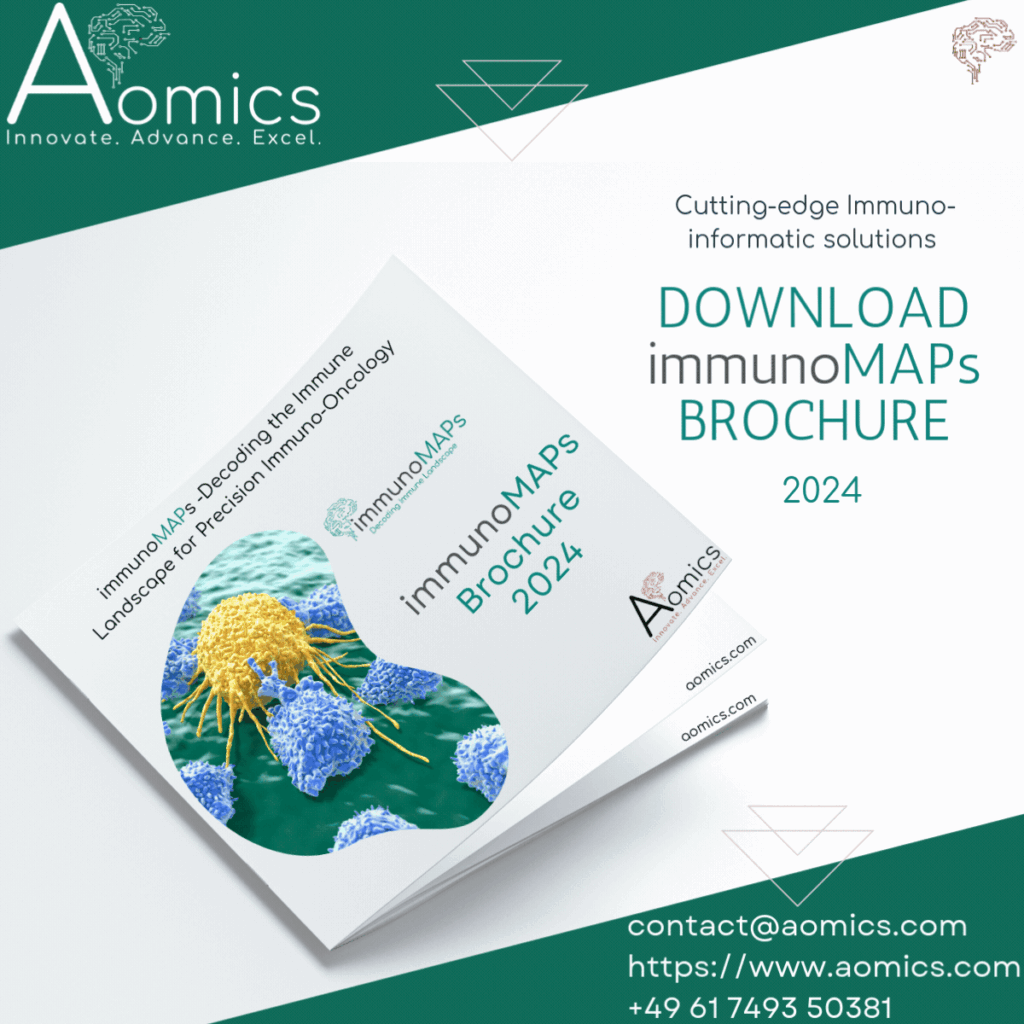Welcome to immunoMAPs analytical platform
immunoMAPs streamlines the immunotherapy development process by providing data-driven valuable insight

immunoMAPs- Analytics-based risk management in immunotherapy development
In the rapidly evolving field of immunotherapy, reducing risks is paramount to successful and safe treatment development. At the heart of our approach lies analytics-driven risk reduction, powered by advanced multi-omics data analytics and specialized immuno-informatics. By integrating and analyzing diverse data sets, including genomics, transcriptomics, proteomics, and metabolomics, we uncover comprehensive insights into the immune response mechanisms. Our immuno-informatics focus allows us to predict potential immune related adverse effects (irAEs), identify biomarkers, and optimize therapeutic strategies, ensuring that every step in the immunotherapy development process is backed by precise, data-driven decisions. This holistic approach not only accelerates the path to innovative treatments but also enhances their safety and efficacy, ultimately transforming patient outcomes.

Benefits for the Biotech, CROs and Pharma SMEs:
immunoMAPs streamlines the immunotherapy development process by providing valuable insights into:
Analyze cell type composition and understand how they shape the immune response
The Tumor Microenvironment (TME) is a complex ecosystem of various cell types, including immune cells, blood vessel cells, and fibroblasts. immunoMAPs analyzes scRNA-Seq to decode makeup of this TME, identifying the different cell types present. This information is crucial because different cell types can either help or hinder the body’s natural immune response to cancer. By understanding the specific cell composition of a patient’s TME, immunoMAPs can predict how immune system might react and tailor therapy development plans accordingly.
Uncover ligand-receptor interactions that influence cell-to-cell communication within the TME
Cells within the TME don’t operate in isolation. They constantly communicate with each other using a complex system of signals. These signals involve molecules called ligands binding to receptors on other cells. immunoMAPs analyzes these ligand-receptor interactions, revealing the communication network within the TME. By understanding how these cells “talk” to each other, immunoMAPs can identify potential targets for immunotherapy drugs. Disrupting specific communication pathways could tip the balance in favor of the immune system, allowing it to better fight the cancer.
Quantify the presence of tumor-infiltrating immune cells
The presence and activity of immune cells within the TME are critical factors in determining the success of the immunotherapy development. immunoMAPs goes beyond just identifying immune cell types. It quantifies the number of these cells infiltrating the tumor. A high number of certain immune cells, like T-cells, can indicate a more robust immune response and potentially better outcomes with immunotherapy. Conversely, low infiltration or the presence of immunosuppressive cells might suggest a need for additional therapy to boost the immune system’s effectiveness.
Predict how patients will respond to specific treatments
Immunotherapy is not a one-size-fits-all approach. immunoMAPs leverages the wealth of data it gathers to predict how a patient’s unique immune system is likely to respond to different immunotherapy options. This personalized prediction allows doctors to make more informed treatment decisions and choose therapies with the highest chance of success for each patient. Ultimately, with the support and huge expertise from oncologists, this can lead to better treatment outcomes and improved patient survival rates.
Identify novel biomarkers for improved patient stratification
Biomarkers are measurable indicators of a biological process. immunoMAPs analyzes the vast amount of data it collects to identify novel biomarkers related to a patient’s immune response and cancer progression. These new biomarkers can be used to further classify patients into more specific subgroups. This improved patient stratification allows for the development of more targeted treatment strategies based on a patient’s unique biological profile.
Minimize the risk of irAEs during clinical trials
While immunotherapy offers significant promise for cancer treatment, it can also come with potential side effects called immune-related adverse events (irAEs). immunoMAPs helps minimize the risk of irAEs by predicting which patients might be more susceptible to these side effects. This allows researchers to develop safer and more tolerable immunotherapy regimens during clinical trials. Knowledge and predictions about potential irAEs could significantly contribute to the clinical development of immunotherapy development projects.
Would you like to start a project with us?
Reach out on the given number or write us an email for further queries regarding project requirements



